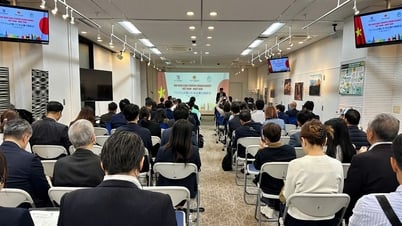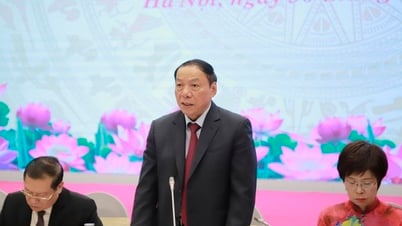Take the gold market for example, domestic prices are always higher than world prices but people still line up to buy. This is the result of the monopoly model of importing and producing gold bars under one brand and no other brands. The market is almost closed, lacking modern transactions such as account gold, spot gold, making the supply inflexible while the demand for storage is high.
Similarly, real estate prices have skyrocketed, far exceeding the affordability of those with real needs. This phenomenon stems from ineffective administrative management thinking such as tightening credit, suspending the issuance of mass project licenses without classifying regions and segments. Management still relies on manual approval instead of data management and information transparency, leading to supply bottlenecks, creating virtual scarcity, thereby pushing prices up...
The business environment is not without its paradoxes: more procedures and licenses but still a lot of counterfeit goods. The reason is that management is still quite heavy on pre-inspection and light on post-inspection, which can create a “request-grant” mechanism, increasing costs for businesses doing business honestly but creating loopholes for fraud to still exist. In public procurement, the bidding process is still quite cumbersome, the evaluation is mechanical, not really based on actual capacity... so there are still many unfortunate cases.
To resolve the above paradoxes, we cannot just deal with each individual phenomenon, we need to change the root of our management thinking. We must definitely shift from “preemptively blocking” to “following and monitoring”, from pre-inspection procedures to post-inspection using data and technology. We need to abolish unnecessary licenses, transparently announce standards so that businesses can operate within the legal framework, while the State focuses on monitoring risks and handling violations.
To operate effectively under the market mechanism, the prerequisite is to eliminate all monopoly mechanisms, such as the designation of a single brand or the concentration of supply in the hands of only a few entities. Instead of the State "choosing the players", it is necessary to focus on building and maintaining a transparent and fair system of "game rules", ensuring that all capable and qualified enterprises can participate in equal competition.
At the same time, instead of using administrative measures, it is possible to use leverage tools. Accordingly, tax is the main regulatory tool of the State, helping to orient production, consumption and investment. Thanks to its flexibility, tax can limit harmful consumption behaviors, while encouraging the development of priority industries. In addition, tax also contributes to income redistribution and promotes sustainable development.
Technology is the key tool to implement the principle of “open to govern” instead of “tightening to control”. The application of Big Data, artificial intelligence (AI) and real-time monitoring systems helps the State accurately classify risks, detect fraudulent behaviors early and handle them promptly and effectively, minimizing inconvenience to businesses, creating conditions for the market to operate smoothly and fairly.
Finally, the mindset of “if you can’t manage it, ban it” must be eradicated. When something new appears, instead of banning it, it is necessary to allow for piloting, monitoring and adjusting. To manage effectively, one must learn to control the unfamiliar, while improving the capacity for guidance and supervision. Only then can new policies both promote innovation and maintain order and discipline.
Transforming thinking is no longer a slogan, but an urgent requirement for effective state governance.
Source: https://www.sggp.org.vn/lay-thi-truong-lam-trung-tam-post797393.html



![[Photo] National Conference "100 years of Vietnamese Revolutionary Press accompanying the glorious cause of the Party and the nation"](https://vphoto.vietnam.vn/thumb/1200x675/vietnam/resource/IMAGE/2025/5/30/1cf6cd5c8a934ebfa347028dcb08358c)
![[Photo] Journalists moved to tears at the Memorial Service for the soldiers who died in Gac Ma](https://vphoto.vietnam.vn/thumb/1200x675/vietnam/resource/IMAGE/2025/5/30/9454613a55c54c16bf8c0efa51883456)
![[Photo] A delegation of 100 journalists from the Vietnam Journalists Association visits the soldiers and people of Truong Sa island district.](https://vphoto.vietnam.vn/thumb/1200x675/vietnam/resource/IMAGE/2025/5/30/0984a986227d4e988177f560d2e1563e)

![[Photo] General Secretary To Lam receives Chief of the Central Office of the Lao People's Revolutionary Party](https://vphoto.vietnam.vn/thumb/1200x675/vietnam/resource/IMAGE/2025/5/30/140435f4b39d4599a3d17975dfb444c5)















































































Comment (0)